|
THE HISTORY OF DISTRICT 9670, Australia
A Part of Our History of
Rotary in Australia
Prepared by the district and not verified by Rotary Global History
| District 9670 is located midway along
the East coast of NSW, Australia. The district runs in a
strip averaging 150 kilometres wide east-west across the
state almost to the Queensland and South Australian
borders. The principal city is Newcastle, with a city
population of 500,000 people. Newcastle is the largest
city in the state of NSW outside Sydney and has one of
the oldest Rotary Clubs in Australia. Newcastle was
formerly the major iron and steel manufacturing location
in Australia. It is an important and thriving port (the
largest coal exporting port in the world) and its
beautiful beaches and temperate climate make it a
popular tourist centre. The Lake Macquarie area is an
important commercial, holiday and industrial location.
|
|
 District 9670 Map
District 9670 Map
|
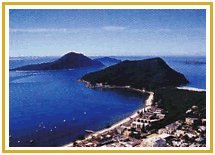 Port Stephens
Port Stephens
|
|
A few kilometres north of Newcastle is Nelson Bay.
This town is located on Port Stephens which is one of
Australia’s major tourist attractions. The area also has
a thriving fishing industry and is famous for its whale
and dolphin observation cruises.
Dungog and Paterson boast some of the best
agricultural country in Australia where dairy farming
and cattle grazing abound. There is also a well
established timber industry. |
| The Cessnock Pokolbin area is home to
the Hunter Vineyards. These vineyards produce some of
the World’s finest wines. The export of Australian wine
especially that from the Hunter has become a major part
of Australia’s economy. The vineyards are also a major
tourist attraction and are home to a number of
championship golf courses. Nearby Maitland, a major
commercial area has four very active Rotary clubs.
A little further west, the Hunter becomes a rich
agricultural and industrial area with many coal mines
producing millions of tonnes of quality coal annually.
|
|
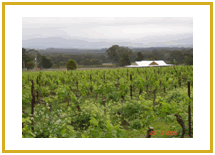 Pokolbin wine country
Pokolbin wine country
|
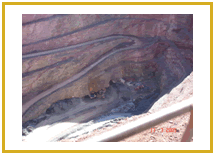 Open cut mine Cobar
Open cut mine Cobar
|
|
Major towns of Singleton and
Muswellbrook support this industry. The Upper Hunter
towns of Scone and Murrurundi are home to some of the
finest thoroughbred studs in the world.
Through Denman and Merriwa and beyond the Great
Dividing Range, a significant mountain range dividing
the coastal areas from the drier flatter inland, lie the
western plains of NSW. This is an agriculturally rich
expanse producing wheat, cotton, garden vegetables,
sheep for wool and meat and many cattle on expansive
cattle stations. Dubbo is a major inland city servicing
much of the agricultural region. The city whose
population is 50,000 is home to four Rotary clubs. |
| South-East of Dubbo are the towns of
Rylstone-Kandos, Wellington and Mudgee, the area
surrounding these towns is developing a wine and tourist
industry to supplement the established agriculture of
the area.
After travelling through Narromine and Nyngan past
Warren we reach the western extremities of the District.
Located here are the early (by Australian standards)
settled small towns of Cobar and Bourke. This area was
formerly an area of large cattle, sheep and wheat
properties. |
|
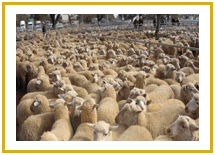 Sheep farming
Sheep farming
|
| In recent times the irrigation water
provided by the Darling River system has allowed cotton
to become a major crop. This newer agricultural pursuit
now compliments the large cattle and sheep properties.
|
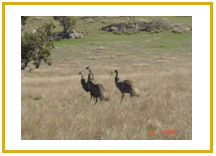 Emus near Merriwa
Emus near Merriwa
|
|
When we talk of Australian settlement we often refer
to European settlement which took place after 1788. Of
course we are very proud of our native Australians whose
history has been dated as far back as 60,000 years,
making the Australian Aboriginal one of the oldest
recorded of Earth’s inhabitants.
District 9670 has 50 Rotary Clubs with approximately
1300 members. The clubs are very supportive of all
Rotary programs. Membership recently has shown a slight
increase. Last year two new clubs were chartered. Our
district conference is held in March each year. Most
other activities such as District Assemblies, PETS and meetings are held
in duplicate in the eastern and western parts of the
district because of the vastness of the district. Of
particular importance to our district are the programs
for youth. We are particularly supportive of the
exchange program with most clubs hosting and sending out
students on a regular basis. |
|






